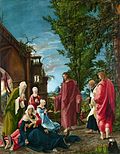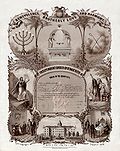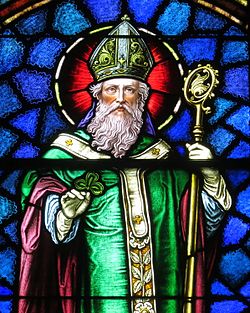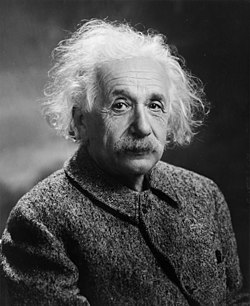Portal:Religion
The Religion Portal
Religion is a range of social-cultural systems, including designated behaviors and practices, morals, beliefs, worldviews, texts, sanctified places, prophecies, ethics, or organizations, that generally relate humanity to supernatural, transcendental, and spiritual elements—although there is no scholarly consensus over what precisely constitutes a religion. It is an essentially contested concept. Different religions may or may not contain various elements ranging from the divine, sacredness, faith, and a supernatural being or beings. (Full article...)
 Vital article
Vital article
Jainism (/ˈdʒeɪnɪzəm/ JAY-niz-əm), also known as Jain Dharma, is an Indian religion whose three main pillars are nonviolence (ahiṃsā), asceticism (aparigraha), and a rejection of any simplistic or one-sided view of truth and reality (anekāntavāda). Jainism traces its spiritual ideas and history through the succession of twenty-four tirthankaras, supreme preachers of dharma. The first tirthankara in the current time cycle is Rishabhadeva, who tradition holds lived millions of years ago; the twenty-third tirthankara is Parshvanatha, traditionally dated to the 9th century BCE; and the twenty-fourth tirthankara is Mahavira, who lived around the 6th or 5th BCE. (Full article...)
 Did you know (auto-generated)
Did you know (auto-generated)
- ... that fictional religions, often described in speculative fiction, have in some cases inspired real religious movements?
- ... that the Grave with the Hands commemorates a married couple, divided by society and religion, with hands clasped over a cemetery wall after death?
- ... that Musa va 'Uj depicts figures from all three Abrahamic religions?
- ... that the author of the comic book Timeless Voyage was the leader of a UFO religion?
- ... that the capital of South Ossetia once had more Jews than Ossetians?
- ... that religious studies scholar C. Jouco Bleeker believed that religions are like acorns?

The Diocletianic or Great Persecution was the last and most severe persecution of Christians in the Roman Empire. In 303, the emperors Diocletian, Maximian, Galerius, and Constantius issued a series of edicts rescinding Christians' legal rights and demanding that they comply with traditional religious practices. Later edicts targeted the clergy and demanded universal sacrifice, ordering all inhabitants to sacrifice to the Roman gods. The persecution varied in intensity across the empire—weakest in Gaul and Britain, where only the first edict was applied, and strongest in the Eastern provinces. Persecutory laws were nullified by different emperors (Galerius with the Edict of Serdica in 311) at different times, but Constantine and Licinius' Edict of Milan in 313 has traditionally marked the end of the persecution. (Full article...)



































































